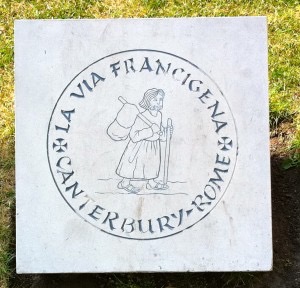Death of a Pilgrim

The Dean Emeritus of Canterbury Cathedral, the Very Rev. Robert Willis, died last month at the age of 77. At the time he was a resident fellow at Berkeley Divinity School at Yale. Dean Robert became famous worldwide during the Covid lockdowns when his live broadcasts of Morning Prayer, often with walk-on roles for his cats Tiger and Leo, became an internet sensation.
Dean Robert was scheduled to visit Christ Church Christiana Hundred as Theologian in Residence on November 7. A few days before his death he gave his final address to a small group, which is available on YouTube. The subject of his talk is pilgrimage. He relates a story of an encounter with two pilgrims who had traveled from New Zealand to Canterbury. After attending the 8 o’clock eucharist at the Cathedral, the dean greets the couple as they are leaving.
“I don’t think we know each other,” he said. They replied, “No. We are from New Zealand. Sadly, we lost our son and are finding it very difficult to cope with.” The couple explained that they had decided to fly to Canterbury, from where they would walk the entire length the Via Francigena. This ancient route begins at Canterbury and ends at Rome, taking in France and Switzerland en route.
Dean Robert led the couple to the Shrine of St. Thomas at Canterbury Cathedral, where he blessed them. He then took them to the gate of the cathedral, and pointed to the stone on the ground. It shows a pilgrim, around which are engraved the words “La Via Francigena”. Here is where you start!
The dean had forgotten all about the New Zealand couple when, three months’ later, he received a postcard. It read “It was everything we expected it to be. Thank you for the beginning.”
Listening to this story, I wondered if the couple had seen the movie, “The Way”, about a pilgrimage to Santiago de Compostela in Spain. The main character, played by Martin Sheen, has a son who dies in the mountains while on pilgrimage. Sheen decides to visit the mountain and complete his son’s pilgrimage. The movie is about grief and also about healing, which occurs in the company of pilgrims of different backgrounds and nationalities.
Taking these stories together - one factual and one fictional - made me wonder if there is a connection between pilgrimage and death? In his talk Dean Robert remarked that “every pilgrimage is an illustration of life, from birth to death.” One could switch the words to read, “Every life is a pilgrimage, from birth to death.” In both senses there is a movement from one thing to another. There is a departure point and a destination. What matters most is how we make that journey, and how we respond to whatever we may encounter along the way.
T.S. Eliot’s poem “The Journey of the Magi” is about the pilgrimage of the Magi to see the new born Son of God. Toward the end of the poem, the narrator asks, “were we led all that way for/Birth or Death?” The birth of Jesus is a threshold in human history. It signals the death of old superstitions and understandings. This realization prompts the narrator - one of the Magi - to utter this closing line: “I should be glad of another death.”
The original reason for pilgrimage was to venerate the relic of a dead saint. Santiago de Compostela houses the remains of the apostle St. James. Being in close proximity to a holy relic could, in some cases, bring miraculous healing. Through the saint’s intercessions and by God’s grace, healing and relief are bestowed upon the beseeching pilgrim.
A common feature of pilgrimages old and new is the traversing of terrain which may be unfamiliar. There is also the interaction with fellow pilgrims and strangers. Untethered from daily routines and familiar frames of reference, pilgrimage heightens our senses and sharpens our awareness. Friendships are made and deepened over the course of a pilgrimage. For some, a closer relationship with God is the result. For others, pilgrimage opens the door to new life.
We do not know the full story of the New Zealand pilgrims. I imagine that at certain times they would have felt their late son’s presence. What were his words to them as they walked the trail? Along the way the couple would have met fellow travelers and shared their story. Each time, as they recounted the terrible tragedy of their son’s death, there would be an expression of sympathy, and perhaps the offering of a similar story. Such exchanges, when sadness is shared, become moments of healing. At that moment, the words of advice and love the couple receive become new strands woven into the fabric of their lives, even into their grief.
We begin every pilgrimage the same way: with our hopes and fears, our hurts and sorrows intact. We walk together, not alone. Our emotional baggage is not left behind - it comes with us. We walk in faith, with love as our compass. The Latin phrase Solvitur ambulando describes our intention. “You solve it by walking it”. By walking we begin to unravel the knots which prevent us from moving forward.
One of the fruits of pilgrimage is wisdom. Someone who grew wise from his own experience of pilgrimage was Robert Willis. He generously shared his learning and love among those who spent time in his company. We salute him as a fellow pilgrim on the Way and pray for him as he embarks upon his next journey.
Father David


0 Comments
There are no comments.
Stay Tuned
Sign-up for David's newsletter